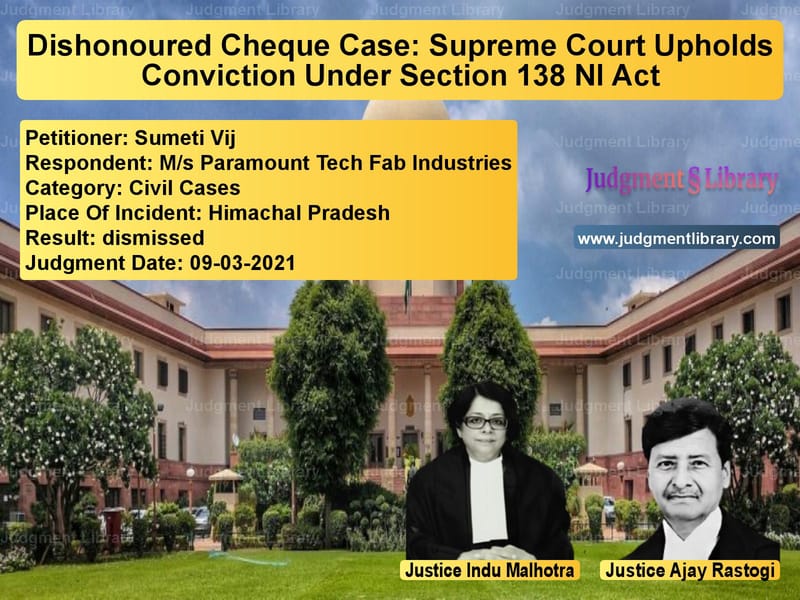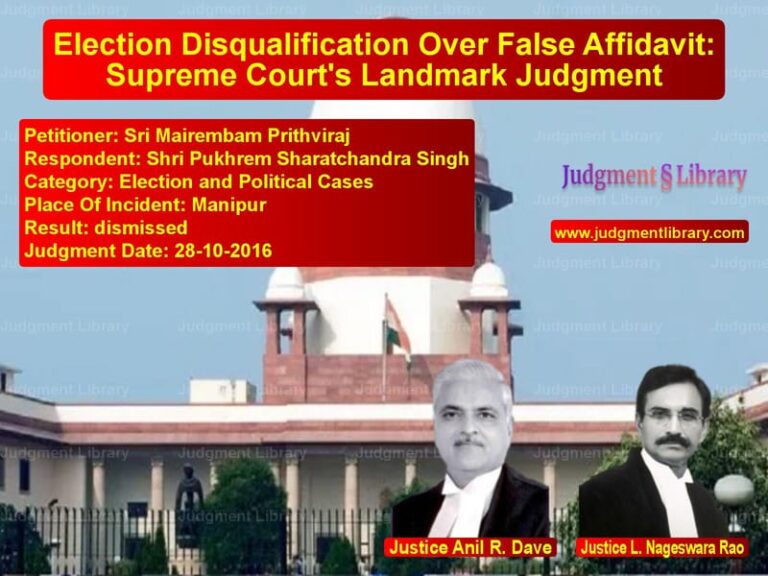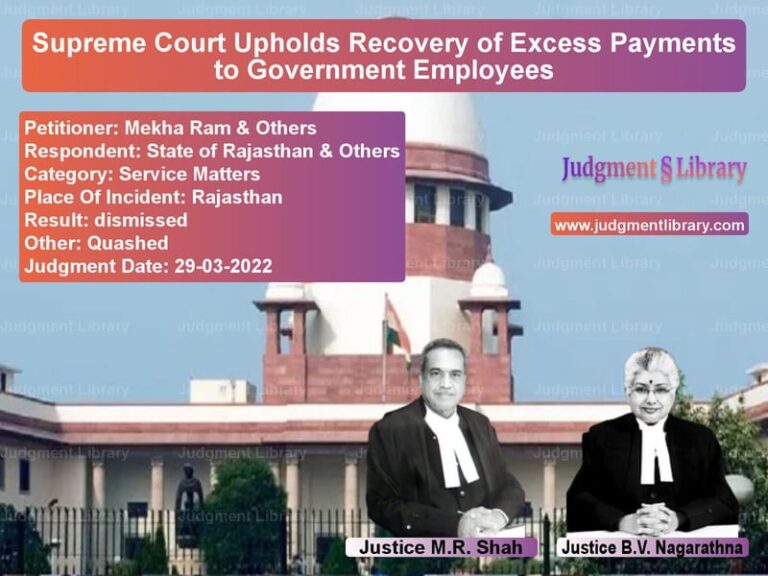Dishonoured Cheque Case: Supreme Court Upholds Conviction Under Section 138 NI Act
The Supreme Court of India delivered an important judgment in the case of Sumeti Vij vs. M/s Paramount Tech Fab Industries, affirming the conviction of the appellant under Section 138 of the Negotiable Instruments Act, 1881. The case involved dishonoured cheques issued by the appellant in connection with a commercial transaction, leading to a legal dispute over the enforcement of financial liabilities.
Background of the Case
The dispute originated from a transaction between the appellant, Sumeti Vij, and the complainant, M/s Paramount Tech Fab Industries. The appellant had placed an order for purchasing non-woven fabric, which was supplied through invoices dated October 1, 2010, and October 16, 2010. The total invoice amount was Rs. 10,17,062, for which the appellant issued two cheques:
- Cheque No. 323930 dated October 15, 2010 for Rs. 5,07,062/-
- Cheque No. 323935 dated November 1, 2010 for Rs. 5,10,000/-
Both cheques were drawn from the Punjab National Bank, Karnal, in discharge of the appellant’s legal liabilities. However, when presented for encashment, they were dishonoured due to insufficient funds in the appellant’s account. The complainant, in response, sent legal notices on October 29, 2010, and November 19, 2010, demanding payment. Despite the notices being duly served, the appellant neither responded nor made any payment within the statutory period.
As a result, two separate complaints were filed under Section 138 of the Negotiable Instruments Act. The trial court initially acquitted the appellant, citing a lack of evidence to prove that the goods were delivered against the cheques issued. However, this decision was reversed by the Himachal Pradesh High Court, which found the appellant guilty and sentenced her accordingly.
Arguments by the Petitioner (Sumeti Vij)
- The complainant failed to prove that the materials/goods were delivered, which is essential to establish the legal liability against the appellant.
- The burden of proof was on the complainant to show that the cheques were issued in discharge of a legally enforceable debt.
- The appellant did not lead any evidence, but the complainant had to stand on its own case without relying on the absence of a defence.
- Issuance of a cheque alone does not constitute liability unless a legally enforceable debt or liability is established.
Arguments by the Respondent (M/s Paramount Tech Fab Industries)
- The complainant had provided sufficient documentary evidence to establish the sale and delivery of goods to the appellant.
- The invoices and transport documents clearly demonstrated that the materials were dispatched and received.
- The cheques were issued in response to the invoices, which constituted a legally enforceable debt.
- Once the cheques were dishonoured, the appellant was served with legal notices but failed to respond or make payment.
- Under Section 139 of the NI Act, there is a presumption that cheques are issued for discharge of debt unless the accused proves otherwise.
Supreme Court’s Observations
The Supreme Court analyzed the relevant provisions of the Negotiable Instruments Act, particularly Sections 118(a), 138, and 139, which govern the presumption of consideration in cheque dishonour cases.
- Presumption of Consideration: Under Section 139, it is presumed that the holder of a cheque received it in discharge of a legally enforceable debt unless the contrary is proven.
- Burden of Proof on the Accused: The Court reiterated that in cases under Section 138, once a cheque is dishonoured, the burden shifts to the accused to rebut the presumption of liability.
- Standard of Proof: The Court held that the standard of proof required to rebut the presumption is preponderance of probabilities and not proof beyond a reasonable doubt.
- Failure to Rebut: The appellant failed to produce any evidence to disprove the liability, thereby allowing the presumption under Section 139 to stand.
The Court stated:
“There is a mandate of presumption of consideration in terms of the provisions of the NI Act, and the onus shifts to the accused upon proof of issuance of a cheque to rebut the presumption that the cheque was issued not for discharge of any debt or liability.”
Supreme Court’s Verdict
- The Supreme Court dismissed the appeals filed by the appellant.
- The conviction under Section 138 of the Negotiable Instruments Act was upheld.
- The Court directed the appellant to either pay the fine or serve the sentence imposed by the High Court.
Impact of the Judgment
- Strengthening Cheque Enforcement: The ruling reinforces the importance of cheque transactions in business and ensures accountability in commercial dealings.
- Presumption in Favor of Complainants: The decision affirms that once a cheque is dishonoured, the burden of proof shifts to the accused to establish the absence of liability.
- Discouraging Frivolous Defenses: The judgment discourages accused individuals from merely denying liability without presenting concrete evidence.
- Upholding Business Integrity: The ruling provides greater confidence to businesses relying on cheque payments, ensuring that defaulters are held accountable.
Conclusion
The Supreme Court’s decision in Sumeti Vij vs. M/s Paramount Tech Fab Industries serves as a crucial precedent in cheque dishonour cases under the Negotiable Instruments Act. It upholds the principles of financial responsibility and reinforces the presumption that cheques are issued for legally enforceable debts. By affirming the conviction, the Court has strengthened the legal framework ensuring that cheque transactions remain a reliable mode of payment.
Petitioner Name: Sumeti Vij.Respondent Name: M/s Paramount Tech Fab Industries.Judgment By: Justice Indu Malhotra, Justice Ajay Rastogi.Place Of Incident: Himachal Pradesh.Judgment Date: 09-03-2021.
Don’t miss out on the full details! Download the complete judgment in PDF format below and gain valuable insights instantly!
Download Judgment: sumeti-vij-vs-ms-paramount-tech-f-supreme-court-of-india-judgment-dated-09-03-2021.pdf
Directly Download Judgment: Directly download this Judgment
See all petitions in Cheque Dishonour Cases
See all petitions in Contract Disputes
See all petitions in Debt Recovery
See all petitions in Damages and Compensation
See all petitions in Judgment by Indu Malhotra
See all petitions in Judgment by Ajay Rastogi
See all petitions in dismissed
See all petitions in supreme court of India judgments March 2021
See all petitions in 2021 judgments
See all posts in Civil Cases Category
See all allowed petitions in Civil Cases Category
See all Dismissed petitions in Civil Cases Category
See all partially allowed petitions in Civil Cases Category







